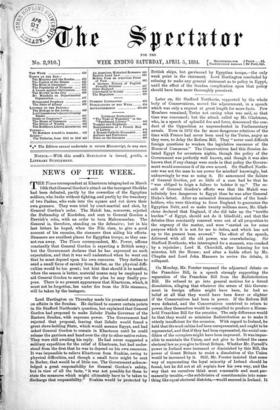Lord Hartington on Thursday made his promised statement on affairs
in the Soudan. He declined to answer certain points in Sir Stafford Northcote's question, but explained that General Gordon had proposed to make Zebehr Pasha Governor of the Eastern Soudan, with supreme power. The Government had rejected that proposal, fearing that Zebehr would found a great slave-holding State, which would menace Egypt, and had asked General Gordon to remain in Khartoum until he could release the garrison and hand over the city to other native rulers. They were still awaiting his reply. He had never suggested a military expedition for the relief of Khartoum, but had under- stood from the first that he was to depend on his own resources. It was impossible to relieve Khartoum from Suakim, owing to physical difficulties, and though a small force might be sent to Berber, that would be of little use. The Government acknow- ledged a great responsibility for General Gordon's safety, but in view of all the facts, "it was not possible for them to state the measures which might ultimately have to 1Ie taken to discharge that responsibility." Suakim would be protected by
British ships, but garrisoned by Egyptian troops,—the only weak point in the statement. Lord Hartington concluded by refusing to make any general statement as to policy in Egypt, until the effect of the Soudan complication upon that policy should have been more thoroughly perceived.














































